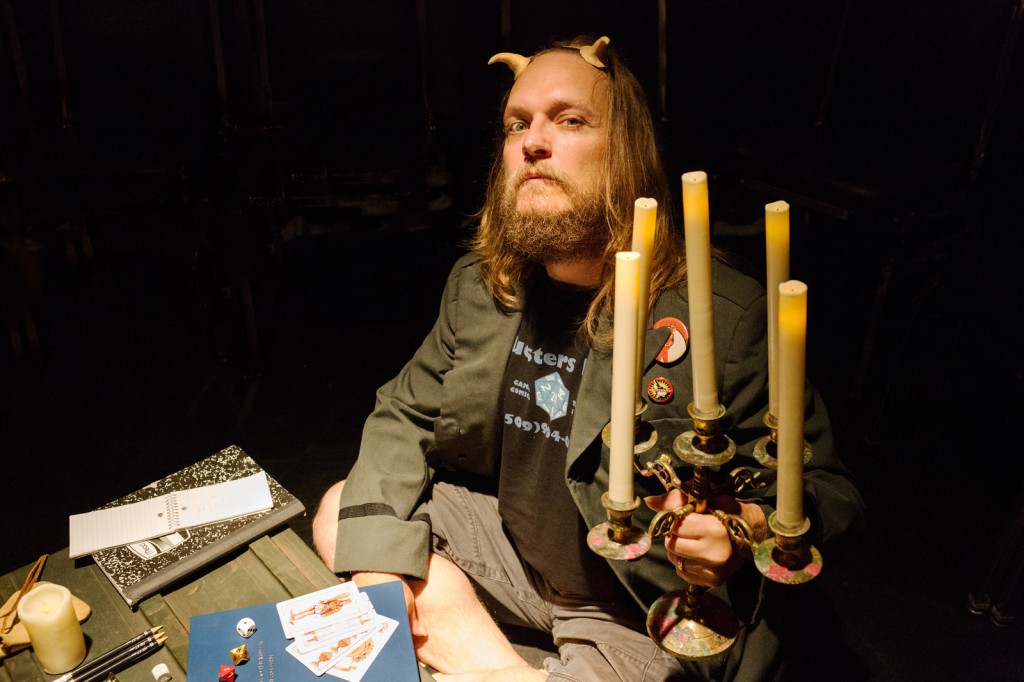
It’s time to roll the dice
I entered curious and vaguely intrigued, but reserved about going in. On an uncharacteristically chilly Miami night, I invited my husband to watch “Now Now Oh Now,” an interactive theater experience from Rude Mechs, an Austin-based theater ensemble made up by Robert S. Fisher, Thomas Graves, Hannah Kenah, Lana Lesley, E. Jason Liebrecht and Shawn Sides. So we bundled up to face the harsh 50 degree weather armed with hot coffee and scarves. Rude Mechs. Photo by Jeremy M. Lange
It started with a choice: pick a talisman engraved with one of five symbols, each representing a smaller group of strangers we would join within the 30-person audience. The theatrics hadn’t even begun before chance selected our adventure for us. A man wearing a cloak and cutoff jeans (a distracting contrast in itself), holding a small electric candelabra revealed himself as our host, the grandmaster. We were polled on our collective interest in comic books, graphic novels, and Dungeons and Dragons. The audience was left wanting, largely ignorant to the worlds he spoke of, with only three people readily admitting to participating in such entertainment. The makeup of our group was set – we’re not comic nerds, we’re clueless to this world, but we’re ready to be submerged. Or at the very least, ready for our promised shot of tequila.
This first act was theater under the guise of a Dungeons and Dragons game. The characters took cues from our grandmaster, who rolled dice to determine their fate and advance the plot. These aren’t actors acting in a play; these are actors representing people who are playing a game, people with lives outside of the magic sock perimeter who are embracing their roles in a game they’ve collectively built. So in true improvised fashion, they step over each other’s lines, sometimes unsure of where to stop their dialogue, hesitant to continue their lines but still committed to the spirit of their characters. Then there were scenes of traditional theater, where their rehearsed lines shone bright and confident. The end result left me feeling like this was a true mix of traditional and improvised theater.
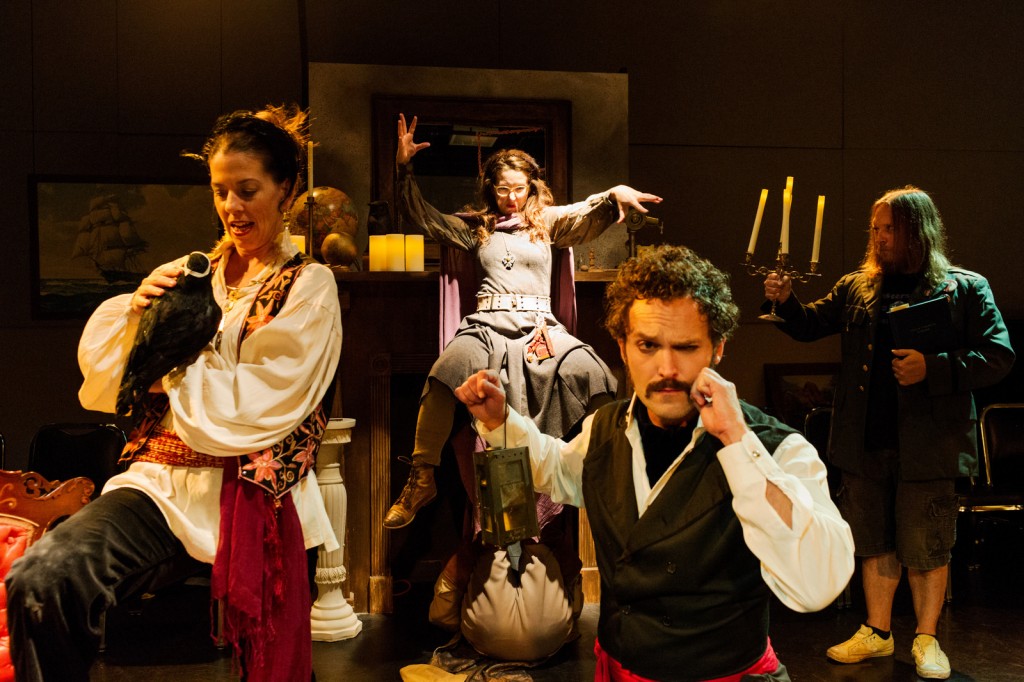
Rude Mechs. Photo by Jeremy M. Lange
I genuinely appreciated the calculated risks the ensemble made with this first act. This could have easily devolved into something completely unpalatable and amateur. We’re an audience unfamiliar with the concept or minutia of D&D, a game more likely associated with the stereotype of an awkward, maladjusted teenager incapable of finding a date to prom. The producers carefully worked within the constraints of these incorrect assumptions and allowed an unfamiliar audience to experience high-brow theater. We trusted our grandmaster to guide us through the production, making us feel invested in its success. The end of the first act worked as a theatrical experience in and of itself. The plot and characters were well defined; we worked through the conflict within their created world.
The actors exited, and so began the audience participation. The chance we took upon entering divided us into small groups. My husband and I met our three team members, a young couple and a clueless person who seemed hard-pressed to know where she was or what she was doing. Each team had to work together to decipher a clue that lead them to some object that, once placed on an assembled mat, created a larger puzzle for the whole audience to solve together.
This idea of small groups working independently of each other to solve small problems (whose solutions are the foundation of a larger puzzle for the collective to solve) immediately appealed to me. It created a sense of camaraderie and cooperation between strangers that few settings can foster. We ended the exercise more aware of each other’s existence, of our participation in theater as opposed to our passive appreciation of it. The intimacy of such a small audience resonated and tied us to one another, different people in different stages of their lives that by coincidence and design were brought to the same room at the same time to engage with each other. Chance bringing us together, circumstance forcing interaction, beauty permeating conscious collectivism.
The setting for the third act was a simple and elegant cross between the last supper and a knight’s reunion table. The 29 of us sat ,curious at the arrangement, unsure of what to do, expecting guidance or instruction as we sat in each other’s company for a few minutes.
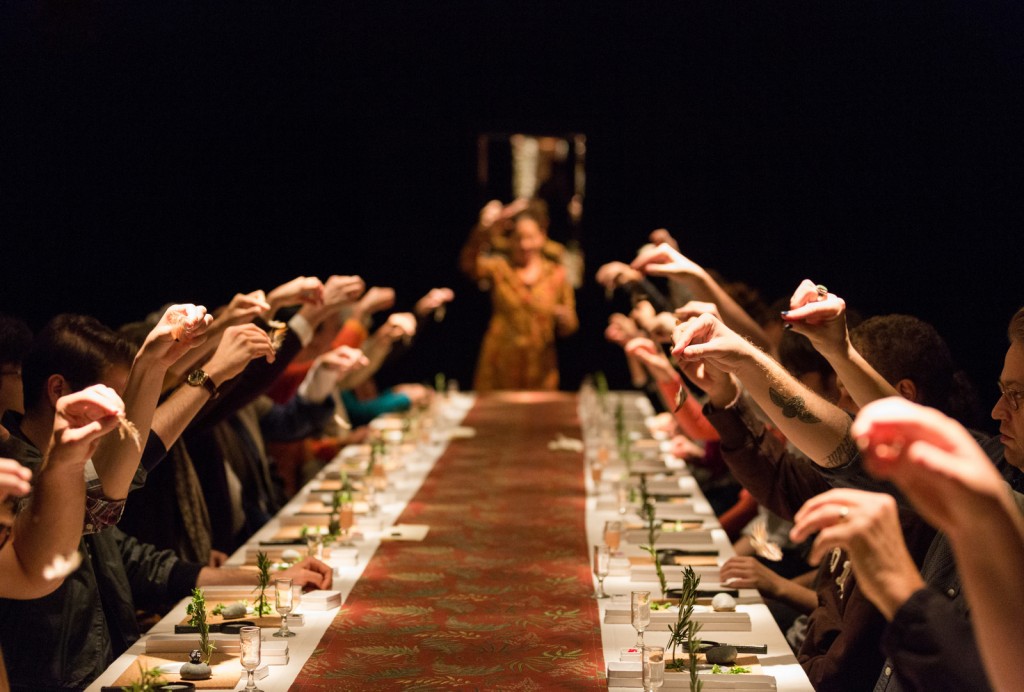
Rude Mechs. Photo by Jeremy M. Lange
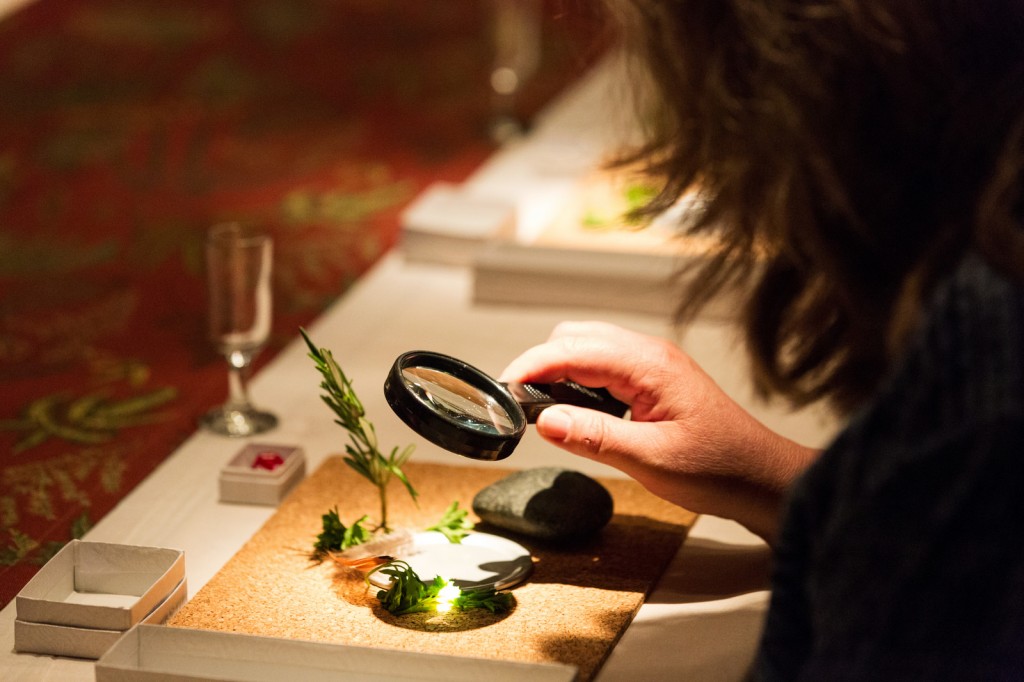
Rude Mechs. Photo by Jeremy M. Lange
The protagonist from our first act entered, introducing herself now as a professional in the evolution of feathers, a woman who had years ago left behind her D&D indulgence. She brought closure to the other characters in the first act and provided continuity from otherwise disjunctive actions. It transitioned our focus from game theater to a serious and intellectual discussion of chance and evolution. She spent our final 20 minutes pontificating over the particularities of evolution, challenging us to select traits favoring beauty and pleasure over fitness. Darwin’s theories were put in proper context, survival of the fittest meaning survival of the species that can best adapt to its environment.
We built our own ecosystems using the metal coaster as our lake and our herbs as shrubberies atop the cork board. With a quip, “It’s time to roll the die” she explored the role/roll of chance in evolution. And just like that, with one simple toss, almost half of us who rolled even just died, our seats pushed back five feet so only the survivors were left accounted for. Our manufactured world was ruined, our species was diminished in numbers, and our vulnerability was revealed.
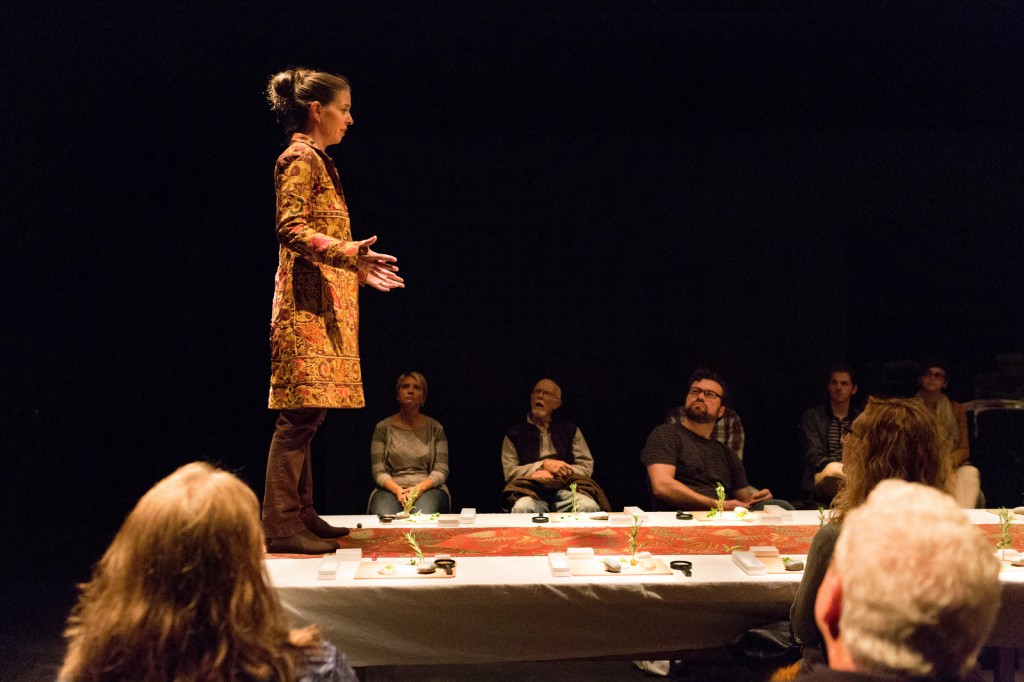
Rude Mechs. Photo by Jeremy M. Lange
It ended with a bang: like the brute force of a gaping black hole, she pulled the tablecloth from in front of us, collapsing our private ecosystems unceremoniously onto the ground, revealing a topographical relief of the planet that expanded the length of the table, from volcanic beginnings, civilized and weather ridden middles, to Icelandic ends. This final act reminded us that no matter what constructs we might make on top of it, it’s the Earth that will remain.
At first glance, this lecture was a great departure from our first and seconds acts; the tone was pedantic and educational, the setting simple and clean, our roles as audience members autonomous and private. But in reality, it was a true conclusion to the themes and symbolism of the other acts. Dungeons and Dragons is a game of chance where players are forced to adapt to the environment that chance has created. Our team building exercise impressed upon us the importance of solving puzzles by using our environment to our advantage. Taken independently, every act was a self-contained success of various degrees, but taken together it charmed the audience through a smooth wave of refined, though quirky, theater. Its success was a true testament to the production value. I left feeling thrilled and engaged, but yearning for more.
“Now Now Oh Now” is co-produced by MDC Live Arts and the Miami Light Project. The final performances will be Friday, February 27th and Saturday, February 28th at 6, 8 and 10 p.m., and Sunday, March 1st at 2, 4 and 6 p.m. at The Light Box at Goldman Warehouse, 404 N.W. 26th St., Miami; 305-576-4350. Click here to buy tickets.
Recent Content
-
Artsarticle ·
-
Artsarticle ·
-
Artsarticle ·

